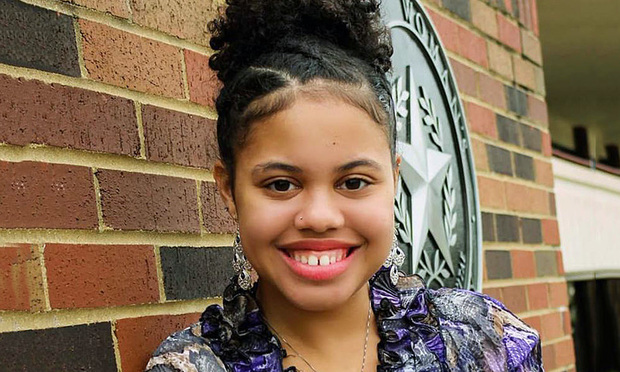Forget Prom. This 16-Year-Old Is Headed to Law School
Haley Taylor Schlitz was accepted at five law schools but opted to enroll at Southern Methodist University Dedman School of Law, in part so she can still live at home with her parents.
March 14, 2019 at 01:53 PM
6 minute read
The original version of this story was published on Texas Lawyer
 Haley Taylor Schlitz, 16, plans to enroll at Southern Methodist University Dedman School of Law in the fall of 2019.
Haley Taylor Schlitz, 16, plans to enroll at Southern Methodist University Dedman School of Law in the fall of 2019.
Most 16-year-olds spend the summer break working, going to camp, or hanging out with their friends. Not so for Haley Taylor Schlitz, who's on track to graduate with both an associate's and bachelor's degree in May. She'll spend the upcoming summer preparing to start law school and attending a six-day program with the American Civil Liberties Union in Washington for incoming law students.
Schlitz was accepted to all five law schools she applied to and has decided to attend Southern Methodist University Dedman School of Law. (The other law schools were at Howard University, University of Arkansas at Little Rock, Southern University and Texas Southern University.)
SMU could not say whether she's the youngest ever to enroll at the Dallas campus, though admissions officials said she's the youngest they know of. We caught up with Schlitz this week to discuss her law school plans, what inspired her to seek a J.D., and what she thinks her new classmates will make of a teenager in their midst. Her answers have been edited for length and clarity.
Why did you pick Southern Methodist University? Was there anything in particular that stood out? A lot of factors went into it. Obviously, I'm 16 so I want to stay at home. My parents suggested getting an apartment, but I really wanted to stay at home. That was huge. I'll commute every day I have class. SMU also offered me the biggest scholarship, which is important too. SMU isn't cheap—totally worth it but isn't cheap. It's a top 50 law school. It's the best law school I got into.
How is it possible that you will start law school at 17? Most law students are 21 and older. It starts way back in my elementary years. I went to public school until fifth grade. At the end of the year my parents pulled me out and started to home-school me because they didn't like the way I was being taught. I was just being taught to pass the end-of-the-year test to get to the next grade. I wasn't being taught to learn. I wasn't in the gifted and talented program because they said I wasn't allowed to be—that I couldn't take the test. My parents got me privately tested and then home-schooled me after they determined that I was gifted. I was home-schooled up until I was 13 years old. I skipped quite a few grades.
Then I graduated high school at 13 and went to the community college from 13 to 14, so I could get my core done. Then I got accepted into numerous different universities, and I went to Texas Woman's University from 14 to 16. And now I'm here at 16 and I applied to numerous different law schools and I'm going to law school.
When did you know you wanted to be a lawyer? My mom's a doctor, so as you can imagine I wanted to be a doctor until I was 12 or 13. I started at [Tarrant County College] with the idea I wanted to be a doctor. Then I looked back at my own story and realized the inequities there are in the education system, especially in the gifted and talented program with girls and girls of color. That's something I felt really passionate about because of my own story, that I wasn't even able to get in. Where I went there were a bunch of boys who were not of color who were able to get in at the same age I wasn't able to get in. It sparked a fire in me and made me want to fight for equality. My mom and dad said, “Well, you can be a lawyer.”
How was the LSAT for you? It was actually really fun. I did the whole program online and I really enjoyed it. I like standardized tests quite a bit. And the LSAT is really fun because it's almost like a puzzle or a mind game. It was really cool. When I took it, it's like they were asking me to solve riddles. I didn't really see it as a test, per se, but more like a game. It was awesome.
Do you get weird looks when you show up in college classes, or to take the LSAT, for example? That's exactly what you would think. And everywhere I go I feel like that's exactly how everybody should look at me. But people must think I'm older than I am because they don't. The only time I got kind of weird looks is when I was 13 and went to [Tarrant County College], because I guess it was really obvious I'm a kid. But when I go to [Texas Woman's University], nobody knows I am so young. When I go to tour SMU or other schools, nobody ever looks at me like that. And I always expect people to say, “Wait a second, how old are you?” And no one ever asks that.
How do you think your professors and classmates at SMU will react when you show up next fall? I recently went to a few law school events. When people found out I was 16 they were really surprised, obviously. Then they asked me how I got here. Every single time someone figures out my age, it changes the dynamic a bit. It's not bad, but it's new attention. But I like the attention. Everybody is always surprised at my age and they ask me a few questions. Then it's over. They're my friends and we work together. But it's not like I get treated differently, in a negative way, like, “Oh, you're a kid. I'm not listening to you.”
Any other ideas of what you want to use your law degree for? It's the educational policy, like we talked about. I'm also really interested in intellectual property. It hits so many things. That's another thing I'm looking into. It sounds cool.
What are you most looking forward to about law school? Probably the classes. I love learning and I'm really excited to learn more about the law and our society.
This content has been archived. It is available through our partners, LexisNexis® and Bloomberg Law.
To view this content, please continue to their sites.
Not a Lexis Subscriber?
Subscribe Now
Not a Bloomberg Law Subscriber?
Subscribe Now
NOT FOR REPRINT
© 2025 ALM Global, LLC, All Rights Reserved. Request academic re-use from www.copyright.com. All other uses, submit a request to [email protected]. For more information visit Asset & Logo Licensing.
You Might Like
View All
University of New Hampshire Law School Launches Specialized Health, Life Sciences Program

Supreme Court Takes Up Case Over Approval of Religious Charter School

The Week in Data Jan. 24: A Look at Legal Industry Trends by the Numbers

Trending Stories
- 1After Botched Landing of United Airlines Boeing 767, Unlikely Plaintiff Sues Carrier
- 2DOT Moves to Roll Back Emissions Rules, Eliminate DEI Programs
- 3No Injury: Despite Proven Claims, Antitrust Suit Fails
- 4Miami-Dade Litigation Over $1.7 Million Brazilian Sugar Deal Faces Turning Point
- 5Trump Ordered by UK Court to Pay Legal Bill Within 28 Days
Who Got The Work
J. Brugh Lower of Gibbons has entered an appearance for industrial equipment supplier Devco Corporation in a pending trademark infringement lawsuit. The suit, accusing the defendant of selling knock-off Graco products, was filed Dec. 18 in New Jersey District Court by Rivkin Radler on behalf of Graco Inc. and Graco Minnesota. The case, assigned to U.S. District Judge Zahid N. Quraishi, is 3:24-cv-11294, Graco Inc. et al v. Devco Corporation.
Who Got The Work
Rebecca Maller-Stein and Kent A. Yalowitz of Arnold & Porter Kaye Scholer have entered their appearances for Hanaco Venture Capital and its executives, Lior Prosor and David Frankel, in a pending securities lawsuit. The action, filed on Dec. 24 in New York Southern District Court by Zell, Aron & Co. on behalf of Goldeneye Advisors, accuses the defendants of negligently and fraudulently managing the plaintiff's $1 million investment. The case, assigned to U.S. District Judge Vernon S. Broderick, is 1:24-cv-09918, Goldeneye Advisors, LLC v. Hanaco Venture Capital, Ltd. et al.
Who Got The Work
Attorneys from A&O Shearman has stepped in as defense counsel for Toronto-Dominion Bank and other defendants in a pending securities class action. The suit, filed Dec. 11 in New York Southern District Court by Bleichmar Fonti & Auld, accuses the defendants of concealing the bank's 'pervasive' deficiencies in regards to its compliance with the Bank Secrecy Act and the quality of its anti-money laundering controls. The case, assigned to U.S. District Judge Arun Subramanian, is 1:24-cv-09445, Gonzalez v. The Toronto-Dominion Bank et al.
Who Got The Work
Crown Castle International, a Pennsylvania company providing shared communications infrastructure, has turned to Luke D. Wolf of Gordon Rees Scully Mansukhani to fend off a pending breach-of-contract lawsuit. The court action, filed Nov. 25 in Michigan Eastern District Court by Hooper Hathaway PC on behalf of The Town Residences LLC, accuses Crown Castle of failing to transfer approximately $30,000 in utility payments from T-Mobile in breach of a roof-top lease and assignment agreement. The case, assigned to U.S. District Judge Susan K. Declercq, is 2:24-cv-13131, The Town Residences LLC v. T-Mobile US, Inc. et al.
Who Got The Work
Wilfred P. Coronato and Daniel M. Schwartz of McCarter & English have stepped in as defense counsel to Electrolux Home Products Inc. in a pending product liability lawsuit. The court action, filed Nov. 26 in New York Eastern District Court by Poulos Lopiccolo PC and Nagel Rice LLP on behalf of David Stern, alleges that the defendant's refrigerators’ drawers and shelving repeatedly break and fall apart within months after purchase. The case, assigned to U.S. District Judge Joan M. Azrack, is 2:24-cv-08204, Stern v. Electrolux Home Products, Inc.
Featured Firms
Law Offices of Gary Martin Hays & Associates, P.C.
(470) 294-1674
Law Offices of Mark E. Salomone
(857) 444-6468
Smith & Hassler
(713) 739-1250








